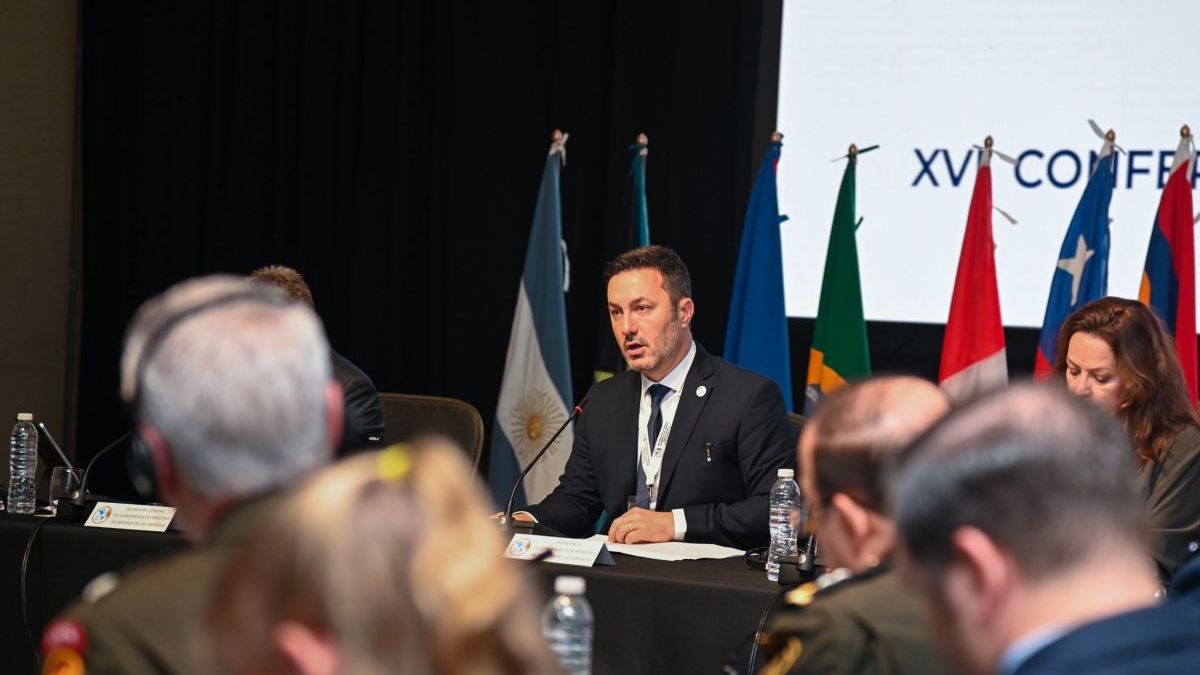Luis Petri gave the opening speech of the inaugural session of the XVI Conference of Defense Ministers of the Americas before more than 25 Defense colleagues from the hemisphere in the Great Hall of the Sun from the Hilton hotel in the town of Guaymallén, Mendoza. Slow oratory and in key paragraphs, a tone of warrior firmness to tune in with an audience permeable to the ammunition of the mind.
“Only through joint action will we be able to face the multidimensional challenges that affect both our region and the entire world. That is the spirit that today in this opening I wish to share with you,” Petri started.
The minister, in his role as host of the Summit, conveyed the president’s greetings Javier Milei“who understands the importance of this forum and has decided to put the security and defense agenda as one of the priorities of his administration.”
Luis Petri’s speech at the XVI Conference of Defense Ministers of the Americas
He then went on to outline Argentina’s vision in current conflicts, the Government’s positioning and the decision to face them together within the cooperative framework of the hemisphere.
The first dart was at the regime Nicolás Maduro: “Today we see that, in countries in our region, democracy has been demolished at its foundations, andn its founding principles and values: countries that preserve a democratic façade but that embody rabid autocracies, as is the case in Venezuela.”
Beyond the appointment with Venezuela, it was clear to any understanding that others mentioned were among those who did not attend the forum, Cuba and Nicaragua.
At the same time, the official praised the multilateral spirit of integration that emerged with the first Summit that took place in Williamsburg in 1995 that promoted a joint approach to the various problems and challenges facing the region in the field of defense.
The continuity of this biannual meeting Summit prevailed over other regional experiments such as the South American Defense Council (CDS) that gave birth to the Union of South American Nations in the times of Lula, Néstor and Hugo, the Bolivarian. A regional club that sought a Latin American imprint without the United States and the projection of its influence on the defense policies of the hemisphere. As if a handful of countries could only by geographical grouping put up fences against the effects of international conflicts in a hyperconnected world.
Next, the minister put the agenda on terrorism: “This is a time of wars, the result of a transition that forces us to reconsider what the rules are in the international system.” “The dilemma is clear: either we strengthen the international system based on the principles of freedom, democracy and respect for human dignity or we allow the advance of dictatorships or autocracies, which in their own name or through their terrorist proxies seek to undermine our democracies,” he added.
Petri defense summit.jpg
Luis Petri, during the opening of the XVI Conference of Defense Ministers of the Americas.
In this sense, the official pointed out that “The Western Hemisphere is not exempt from the two ongoing wars that threaten international stability. “Ukraine fights for its territorial integrity and Israel for its right to exist, and both for its survival.”
The phrase is the central task that Petri wishes to install in the debates of his colleagues and delegations. There are differences. In the preparatory meetings, Brazil, Chile and Mexico distanced themselves as seen in their respective foreign policies.
A situation that Petri and his Pentagon counterpart, Lloyd Austin, had already discussed in a telephone communication at the beginning of October, when the US Secretary of Defense thanked Argentina for joining the Ukraine Defense Contact Group, and both reaffirmed their commitment to the two countries to support a democratic, independent and sovereign Ukraine that can defend itself and deter Russian aggression.
“The presence of extra-hemispheric actors that support non-democratic regimes, such as Russia or Iran, is a serious threat. These regimes use the repressive apparatus of their States to persecute opponents, alter political discussion and threaten territorial integrity, while protecting illegal activities,” he commented.
Following this line, the official highlighted that “these actions have generated greater degrees of oppression and have forced many people to resign their right to live a full life in their countries, as witnessed by the largest historical exodus from our continent, which is worsening day by day. every day in Venezuela.”
It also introduced domestic policy content in accordance with the reform of the Defense law submitted to Congress using the Haitian crisis as a model.
“The combined threats from state and non-state actors grow in adversity, disorder and manipulation of the rules, as demonstrated by the tragic situation in Haiti.
Challenges
He listed issues that will be of direct concern to the defense that in the first stage are stated as challenges:
“Transnational actors, without rules but with determination, andThey are acting to corrode the integrity of our States. Transnational criminal groups, drug trafficking, terrorism and their support networks, illegal fishing, illicit mining, human trafficking and the intentional burning of forests, as well as forced displacement due to political persecution or lack of development, represent complex challenges for our society. region”.
He took advantage of the plenary session of regional defense leaders as well as observer countries including France and Portugal and referred to the Malvinas issue.
“We have active territorial claims that are unwavering, such as the claim for sovereignty in our Malvinas Islands and South Atlantic Islands, and we will continue to fight for a solution to said dispute, but that will not prevent us from working side by side with all the actors that are involved. present to guarantee that our field is a contributor to global peace and stability,” he concluded.
Source: Ambito




